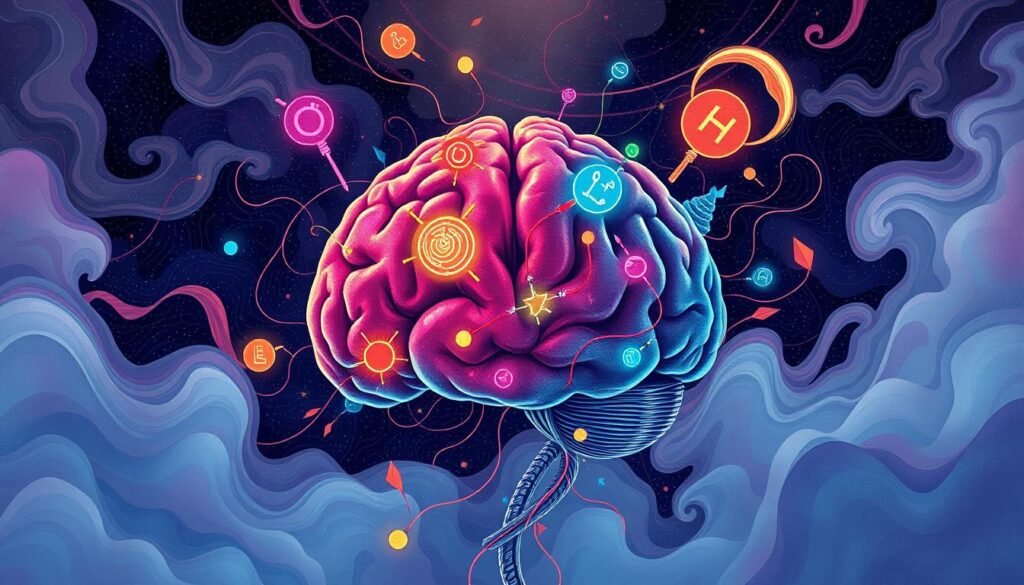Did you know the human body makes over 50 different hormones? Each one is crucial for regulating functions like mood and stress responses. When the balance of these hormones is off, it can lead to anxiety. This affects millions of people around the globe. Our guide will dive into the link between hormones and anxiety. We’ll see how changes in these important chemicals can cause emotional upset. Plus, we’ll cover ways to manage hormone imbalances.
Key Takeaways
- An imbalance in thyroid hormones can lead to anxiety symptoms.
- Fluctuations in sex hormones increase susceptibility to anxiety.
- Imbalances in neurotransmitters like GABA and serotonin are linked to heightened anxiety.
- Chronic high levels of cortisol can elevate anxiety and risk for anxiety disorders.
- Excessive adrenaline release during stress can exacerbate anxiety symptoms.
- Understanding hormonal effects on mood can help in mental health management.
- Recognizing hormone-related symptoms can lead to effective treatments.
Introduction to Hormones
Hormones are key chemical messengers made by the endocrine system. They manage many body functions. This includes metabolism, growth, and emotional health. Hormones have a big impact on how we feel. Women often see more changes in hormones than men do.
These changes can bring mood swings, anxiety, anger, and sleep problems. For example, estrogen and thyroid hormones affect our mood a lot. It’s important to check hormone levels, but how we feel matters more. There are many ways to treat hormone imbalances.
Having a healthy lifestyle helps handle hormone ups and downs. Diet and exercise are key for staying mentally healthy. Working out improves mood and reduces anxiety. Eating well supports the brain and body’s health. For tips on hormones and anxiety, check out this source.
Understanding the Connection Between Hormones and Anxiety
The link between hormones and anxiety affects emotional health, especially in females from birth. Life stages like puberty and menopause bring big hormone changes. These changes often cause anxiety, showing the importance of knowing about hormones and mental health.
Estrogen rises in the first part of the menstrual cycle, boosting mood. But, a big drop in estrogen later can cause anxiety for many. About 80% of females in their reproductive years have symptoms during this phase. Symptoms can be physical or emotional.
Lower testosterone levels also link to more anxiety in females. Stress hormones like cortisol can make anxiety worse if they’re triggered too much. They make emotional responses stronger without any real danger.
Thyroid hormones play a big role too. Too much can make you anxious and restless. Too little can make you tired and depressed. Thyroid problems can also make anxiety worse, which shows why hormonal health is key.
It’s crucial to understand how hormones affect anxiety. Anxiety can point to hormonal imbalances. By focusing on these issues, people can better handle their mental health and feel better overall.
Can Hormones Cause Anxiety?
Hormones play a big role in anxiety by affecting our body and mind. An imbalance can cause health issues, including anxiety. Changes in hormone levels can upset our mood and how we handle stress.
Cortisol is known as the stress hormone. It goes up when we’re stressed. If this happens a lot, our anxiety can get worse. Estrogen changes during periods, pregnancy, and menopause can also trigger anxiety. Anxiety can increase when estrogen drops in the menstrual cycle.
Thyroid hormones help control anxiety. Too much or too little can lead to anxiety. Low testosterone can make individuals assigned female at birth feel more anxious or depressed. This shows how hormones affect mental health.
- Symptoms of hormonal imbalance related to anxiety may include:
- Irregular periods
- Fatigue
- Weight fluctuations
- Digestive issues
Dealing with anxiety caused by hormones involves a whole-body approach. Changing your lifestyle, like eating better and exercising, can help manage stress. Activities like exercise and mindfulness can boost your hormones and lower anxiety.
It’s important to know that hormonal imbalances can make anxiety worse. If you think hormones are affecting your mood, talk to a doctor. They can help diagnose and treat you, improving your mental health.
Key Hormones Affecting Anxiety
Understanding how key hormones play a part in anxiety is helpful. They have a big effect on our emotional health. Let’s look at the main hormones linked to anxiety.
Estrogen and Progesterone
Estrogen changes during the menstrual cycle, affecting serotonin, which is key for mood. High estrogen can improve mood. But low levels can cause mood swings and more anxiety. These changes are clear during pregnancy, menopause, and premenstrual syndrome, impacting emotions.
Cortisol and Stress
Cortisol is the “stress hormone” that appears in high-stress moments. If cortisol is always high, it can make anxiety worse. This leads to fatigue and trouble focusing. High cortisol for too long can hurt our physical health too, making mood and anxiety issues harder to manage.
Testosterone
Testosterone is not just a male hormone. It’s key for emotional well-being in all genders. Low levels can increase anxiety and mood problems, especially in social settings. As men get older, lower testosterone levels can make them more prone to anxiety, which shows how significant this hormone is at any age.

| Hormone | Role in Anxiety | Impact of Imbalance | Management Strategies |
|---|---|---|---|
| Estrogen | Affects serotonin levels | Mood swings, increased anxiety | Diet, exercise, self-care |
| Cortisol | Regulates stress response | Chronic fatigue, anxiety | Relaxation techniques, mindfulness |
| Testosterone | Emotion regulation | Increased anxiety, social discomfort | Regular exercise, hormone monitoring |
How Hormones Influence Mood and Mental Health
Hormones play a key role in guiding our moods and mental well-being. They influence chemicals in our brain and body, like serotonin and dopamine. These chemicals are vital for feeling stable and happy. If they’re out of balance, we can feel really anxious or upset.
Neurotransmitters and Mood
Our moods depend a lot on the balance of our hormones and neurotransmitters. For example, low serotonin is common in people with anxiety or depression. Imbalances in thyroid hormones can make us feel sad or more anxious, too. Changes in our bodies, like during periods, pregnancy, or menopause, can also shake up our emotions.
There are several key hormonal factors:
- Changes in estrogen and progesterone can lead to mood swings before periods.
- Thyroid problems can make people feel down or anxious, especially after childbirth.
- When we’re stressed, cortisol goes up. This messes with our mood by affecting serotonin and dopamine.
Knowing about these hormone effects helps us find ways to feel better. Treatments may include hormone therapy or lifestyle tweaks like working out or meditating. These can help balance our hormones and improve our moods.
| Hormone Factor | Impact on Mood | Associated Conditions |
|---|---|---|
| Serotonin | Regulates mood and behavior | Anxiety disorders, depression, PTSD |
| Cortisol | Stress hormone, affects mood stability | Chronic stress, anxiety, depression |
| Thyroid Hormones | Affects emotional health | Hypothyroidism, hyperthyroidism |
| Estrogen & Progesterone | Influences mood significantly | PMDD, postpartum depression, menopausal symptoms |
| Dopamine | Involved in reward and pleasure | Depression, ADHD symptoms |
Effects of Thyroid Hormones on Anxiety
Thyroid hormones play a big role in our emotional well-being. If our thyroid is not balanced, it can affect our mental health. This balance is essential for dealing with anxiety and depression.
Hyperthyroidism and Anxiety
Hyperthyroidism happens when your body makes too much thyroid hormone. This can make anxiety worse. Symptoms include feeling irritable, having panic attacks, and not being able to calm your thoughts.
This condition can be mistaken for general anxiety disorder because they share symptoms. A study showed that some people with anxiety might actually have hyperthyroidism. When thyroid hormone levels change quickly, it can lead to emotional problems. It’s important to keep thyroid levels stable.
- Restlessness and irritability.
- Difficulty sleeping.
- Physical symptoms such as heart palpitations.
- Increased feelings of anxiety.
Hypothyroidism and Depression
Hypothyroidism can make you feel depressed and tired. It often comes with trouble focusing and forgetting things, which makes hopelessness worse. Those with hypothyroidism may feel emotionally worn out, and it makes anxiety harder to deal with.
Sometimes, even when thyroid levels get back to normal, the psychological symptoms stay. This shows how important it is to treat both the mind and body. Treatments should help both thyroid and mental health.
| Condition | Common Symptoms | Mental Health Impact |
|---|---|---|
| Hyperthyroidism | Restlessness, irritability, insomnia | Heightened anxiety, panic attacks |
| Hypothyroidism | Fatigue, cognitive issues, weight changes | Depression, low energy |

Dealing with the emotional effects of thyroid problems needs a careful approach. By focusing on thyroid health, we can see big improvements in how we feel mentally. It’s key to understand these conditions to get the right help for both mind and body health.
Impact of Stress Hormones: Cortisol and Adrenaline
Cortisol and adrenaline are key in our body’s fight-or-flight response. These hormones help us face dangers, but too much can cause health issues. High levels can make anxiety worse, trapping people in a stress cycle.
Chronic stress can lead to health problems like:
- Anxiety and depression
- Digestive disturbances
- Headaches
- Muscle tension
- Cardiovascular diseases
- High blood pressure
- Stroke
Our genes and life experiences shape how we react to stress. Childhood trauma can make a person more prone to stress as an adult.
It’s key to manage stress to avoid cortisol effects on health. Some healthy habits include:
- Regular exercise
- A healthy diet
- Consistent sleep patterns
- Relaxation exercises
- Engaging in hobbies
- Socializing with friends and family
- Using humor
- Volunteering
- Seeking professional counseling
Such habits can improve life quality and health. They also strengthen social bonds. Chronic stress leads to health issues like atherosclerosis and heart risk.
| Health Issue | Impact of Chronic Stress |
|---|---|
| Anxiety | Increased symptoms resulting from prolonged exposure to cortisol |
| Cardiovascular Disease | Elevated stress hormones impact vascular function and metabolism |
| Digestive Problems | Stress hormones can disrupt regular digestive processes |
| Muscle Tension | Heightened stress levels can lead to chronic muscle stiffness |
| Depression | Maladaptive reactions due to prolonged stress response |
Understanding the impact of stress hormones on our health is critical. Taking steps to manage stress can help us maintain emotional well-being.
Understanding Hormones and Anxiety Disorders
Hormonal imbalances play a big role in anxiety disorders. People often deal with symptoms that make mental health issues worse. Knowing these symptoms helps find the link between anxiety and hormone changes.
Symptoms of Hormonal Imbalances
Anxiety can show up in many ways because of hormone shifts. Those assigned female at birth might face extra anxiety during certain menstrual cycle phases. Studies show they often have more anxiety than males. Knowing how hormone changes affect anxiety is crucial.
- Irritability
- Restlessness
- Mood swings
- Difficulty sleeping
Major hormonal events like pregnancy or menopause may make anxiety worse. Before menstruation, anxiety can increase due to hormone changes. Anxiety disorders are also linked to autoimmune thyroid issues, causing more thyroid gland blood flow.
Thankfully, we can check for hormonal imbalances at home. Testing kits for estrogen and testosterone help guide treatment. Eating fiber and omega-3s, exercising, and using relaxation techniques can also manage anxiety and boost mental health.

Understanding anxiety’s root causes related to hormones helps people seek effective treatment. Each symptom points toward a path to better physical and emotional health.
| Symptom | Description |
|---|---|
| Irritability | An increased sensitivity to stress and frustration. |
| Restlessness | A feeling of being unable to relax or calm down. |
| Mood swings | Sudden and intense changes in emotional state. |
| Difficulty sleeping | Struggles with falling or staying asleep due to anxious thoughts. |
How to Treat Hormone-Induced Anxiety
Identifying hormonal imbalances starts with testing. Once found, treatment options for hormonal levels and anxiety symptoms become available.
Lifestyle changes can greatly improve anxiety management. Strategies like regular exercise, stress management, and a balanced diet help. They promote hormonal balance and mental wellness. Getting enough sleep is also critical for anxiety management and hormone function.
Cognitive behavioral therapy (CBT) helps in changing negative thoughts during hormone fluctuations. This is especially true for women in menopause. Medications, including antidepressants like SSRIs and SNRIs, might be used when needed. For severe symptoms, hormone therapy is often recommended.
The following table summarizes different treatment needs based on symptoms and hormonal conditions:
| Condition/Symptom | Treatment Options | Considerations |
|---|---|---|
| Anxiety during Menopause | CBT, HRT, Lifestyle changes | Consult a doctor for personalized care |
| Low Testosterone related Anxiety | Hormone therapy, Medications | Monitor hormone levels regularly |
| General Hormonal Imbalance | Bioidentical hormone replacement therapy, Therapy | Tailor approach to individual symptoms |
A personalized approach is key for effective anxiety management due to the complex hormone-anxiety link. Consulting healthcare providers is advised to explore suitable solutions. Discovering the connection between hormones and anxiety can improve well-being.
Conclusion
Hormones and anxiety have a complex link that’s key to managing mental health well. Studies show that changes in hormones can greatly affect anxiety, mostly in women. This is because women are twice as likely to face depression and anxiety compared to men, with hormones being a big reason.
Understanding the effect of hormones can help in finding the right treatment and coping methods for anxiety. It’s very important to ask for help when it’s needed.
PTSD symptoms often hit women harder, and this can get worse with low estrogen during their periods. By knowing the link between hormones and mood, women can manage their mental health better. For help with stress and anxiety, there are good stress management techniques available.
Research also points out how life stages and hormonal shifts, especially during menopause, affect women’s mental health. This shows the need for more personalized treatments that take hormonal changes into account. Knowing how hormones play a role is vital for better mental health and a happier life.